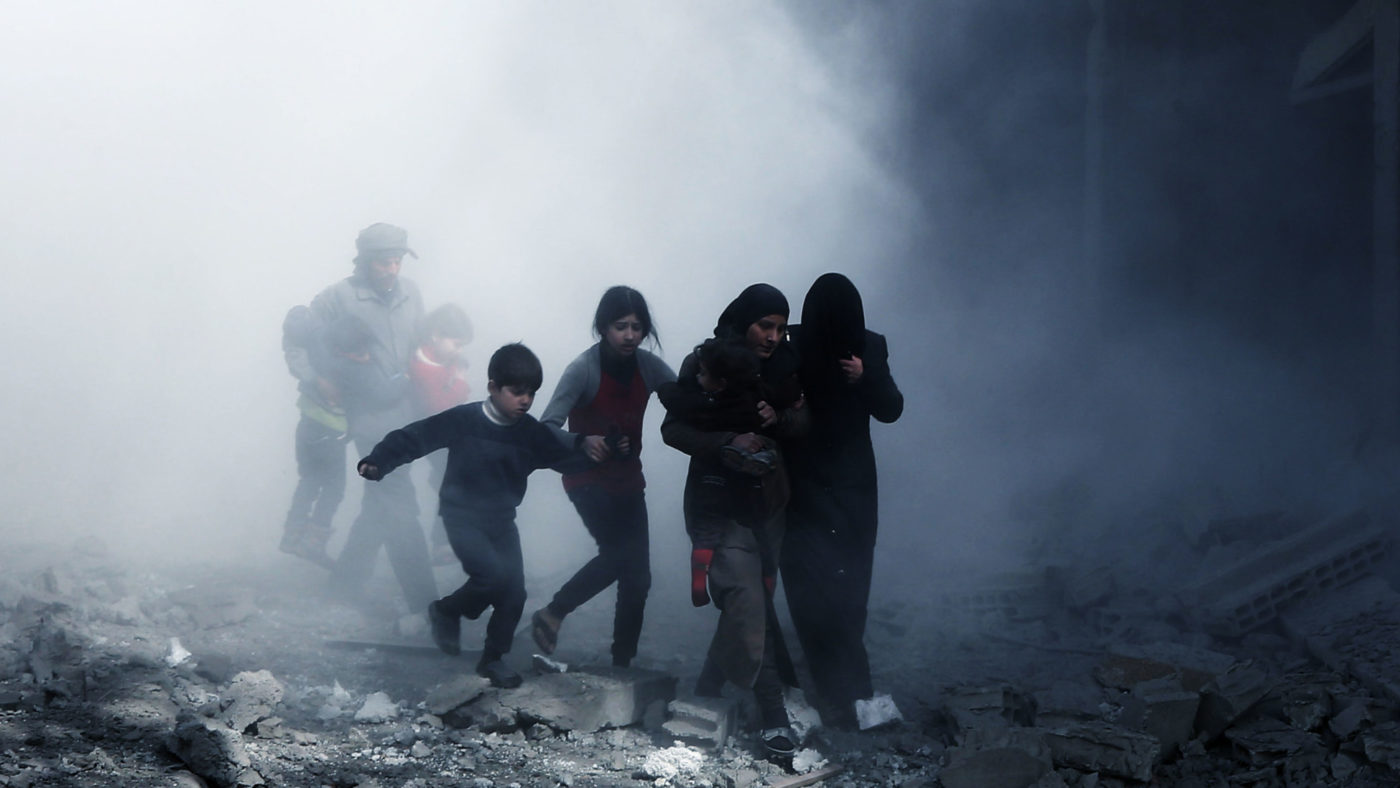You don’t have to look far for an indication that seven years in, the Syrian war is reaching even bloodier heights. Images from Eastern Ghouta, the suburb of Damascus where over 200 civilians, many of them women and children,have been killed in the last three days, show the effects of the relentless bombardment from artillery and jets by President Assad’s forces based nearby. Yesterday, France’s Ambassador to the UN described it as the darkest period in the conflict. “The situation can not be worse,” Ambassador François Delattre told reporters ahead of a Security Council meeting.
The bitter irony is that Ghouta was supposed to be one of the de-escalation zones negotiated between the Russians, the Syrian regime and the various rebel groups who have attended their peace talks in Astana. Temporary ceasefires have barely lasted long enough for some children to be evacuated to hospitals in the centre of Damascus, before the doors closed and the citizens of Ghouta were again attacked with chlorine gas, cluster- and barrel- bombs.
At Sweden and Kuwait’s request, the UN Security Council met to discuss this surge in violence, while the UN’s assistant humanitarian coordinator for Syria, Panos Moumtzis, has asked for a new one-month ceasefire. The problem, as always, is the Security Council’s permanent member, Russia. It’s no coincidence that the current peace initiatives on Syria, in Sochi and Astana have taken place in cities firmly within the Russian sphere. As a spokesman for one of the Islamist militias controlling Eastern Ghouta noted on their talks with the Russians over the Syrian government: “We don’t see them as mediators. We see them as the final commander in the regime’s ranks.”
For Vladimir Putin, the stakes have been raised by Assad’s increasing reliance on Iranian militias which threaten to directly challenge Russia’s exercise of power in the region. At a time when Russian generals openly boast how Syria has proven a good testing ground for their military – “Now we’re confident in our weapons,” General Valery Gerasimov told a pro-Kremlin newspaper – it’s easy to underestimate just how much Russia’s strategic objectives in Syria are governed by realpolitik.
The initial goal was to protect Russia’s Mediterranean naval facility at Tartus at the same time as tackling Islamic extremism near its southern border and protecting an important ally. Having achieved these ends, the plan now seems to be ensuring that President Assad is sufficiently stable and favourable to Russia that their military can declare “mission accomplished”, extricate itself and not be burdened with rebuilding the country. With an election coming up next month and growing disillusionment at home, it appears to be an opportune moment for Putin to exit the Syrian scene without rocking the boat any further.
This is why Russia is so reluctant to investigate the use of chemical weapons in Syria. Russia voted against the resumption of the UN investigatory programme last year and clashed with the US at the Security Council on Monday over a planned statement to condemn the use of chemical weapons against children. So far Russia has wielded its veto 11 times to protect President Assad’s regime, with yesterday’s meeting ending in a similar impasse.
The result of Russian realpolitik is Eastern Ghouta. The 400,000 civilians who find themselves trapped between the regime’s “Starve or Surrender” policy, and their indiscriminate bombardment of the Islamists among them, are prevented from receiving any form of international help by Russia’s shielding of the Assad regime.
Like Homs and Aleppo before it, it’s easy to have compassion fatigue after seven years of fighting and hundreds of thousands of civilian deaths. But hearing reports in recent days of a bereaved father searching for his second lost daughter in the rubble, or of five children being killed in one strike as they collected water explains why Boris Johnson today described the massacres in Eastern Ghouta as “new levels of suffering.”
Unfortunately the second part of the Foreign Secretary’s statement shows why we in the West are powerless to stop this. Eastern Ghouta and Idlib, where refugees from the earlier bombing of Aleppo fled only to face more bombardment, are an example of what happens when the West leaves the playing field open to countries with a far more brutal attitude to realpolitik. “Russia and Iran: you hold the keys… to the end of this obscene conflict,” Johnson said. Unfortunately we in the West no longer carry a big stick to back up these calls; all we can do is to speak softly from the sidelines, to increasingly little effect.


